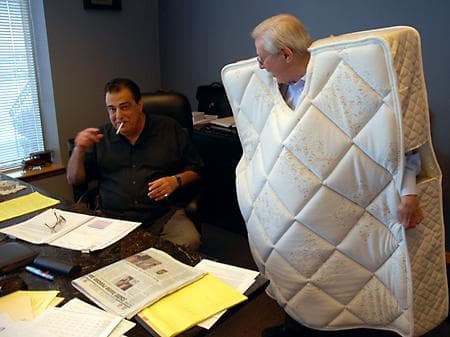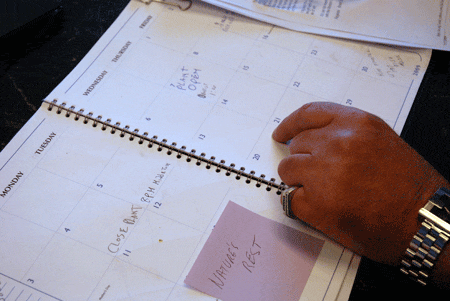Advertisement
His Former Factory Set To Close, Chelsea Man Goes To The Mattresses
Resume
If you've been yearning for good news recently, this is it.
It all began Monday, May 4. A management-led buyout at Spring Air, a major mattress company, had failed, forcing the company to shut down almost all of its factories, including one in Chelsea.
"I came here that Monday morning," said Ralph Melen, 77, a salesman in the mattress business for more than 50 years. "People were outside, standing there, and they had security people, wouldn't let anybody in."
Melen had never seen anything like it. He pulled up to the factory at 6:30 in the morning. Seventy baffled workers were nervously milling around, wondering why security guards were rooted in front of locked doors.
Melen wouldn't have it. "Of course I said, I said to security, 'I'm getting in that goddamn place.' But none of the workers were allowed in. And then he showed up afterwards."
"He" is the man who used to own the factory: Edward Bates. Spring Air's logo is a bear curled up on a mattress, and it's an apt description for 60-year-old Bates. A big, dark-haired grizzly bear on the outside. Soft-hearted and sensitive on the inside.
Bates founded the factory in 1972 on a borrowed $3,500. That $3,500 had grown into an $18.5-million manufacturing company by the time Bates sold the business to Spring Air in 2007.
By all accounts, Bates had done well. But he couldn't completely let go. He owned the building that housed the factory, and offered his services as a consultant to Spring Air.
Consequently, he'd heard about the shutdown on Sunday night, May 3, via a mandatory conference call from Spring Air headquarters. Bates arrived at the plant the next morning at 9:30, three hours after the lockout. All his former employees were still there.
"And I found all the people in the street, OK?" Bates recalled. "So they had their pink slips, ready to go. And so it bothered me. I says, when I see them there, I'm going to buy this factory. I didn't know what I was going to do with it, OK? But I knew we were going to put the people back to work and we'll figure it out later. With good people, with a plan to do whatever you choose to do, you're going to get it done, alright?"
Bates was on the phone for the next three days. By Wednesday, he'd done it. He'd bought the factory back from Spring Air.

"If you went to Harvard for business, you would never do what I'm doing, OK? It would take a good businessman — sit down and put together a plan. And by the time he figured that, these people would never go back to work. It'd be three months," Bates said. "Some people think I'm crazy. OK, I probably am. I put some money down to make this happen, and I feel good about it."
Bates declined to say how much he paid, or how much outside capital he had to raise.
Employees aren't concerned about the financial details.
"Are you kidding me?" said Bill Huertas, the vice president of sales. Huertas notes that some employees have been at the factory for more than 30 years. Until that Thursday, they were all facing unemployment. Huertas believes Bates didn't just save their jobs. He saved their spirits.
"People walk around and they're working. They're working long hours, with a smile on their face. Last week, we were pretty much all volunteers. No one had a job at that point in time, but we knew it was what we wanted to do. And this is the fruit of our efforts, which is great. Oh yeah, it's fantastic."
But make no mistake. This isn't simply a naive little story about altruism in hard times. Edward Bates is an intelligent businessman. It wasn't by accident that the 60-year-old went from hand hammering box springs in the 1960s to driving a maroon Rolls Royce today.
He knows a choice opportunity when he sees one, and Bates readily admits he'll probably make money off the factory again. For him, the money comes with responsibility.
"The entrepreneurs of the country, they're sitting on the sidelines. Whether they've sold their small business or made their fortunes," Bates said.
"They should now turn around and invest back in. Put people back to work, make things happen, you know. That's what we're doing in Chelsea, OK? I'm trying to spread the word for the country. You know? We all can't be Warren Buffett, Bill Gates or Donald Trump. But we can be what we are, and be proud of what we are, OK?"
This program aired on May 13, 2009.
